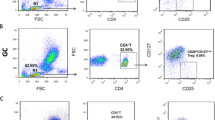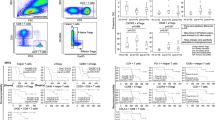Abstract
Background: Dendritic cells (DCs) are important for an immune surveillance. Myeloid DCs (DC1) are important for an effective antitumor immune system. The function and count of circulating DC1 (cDC1) in hosts with a malignant tumor would be defective. This study focused on analyzing the immunological features of cDC1 in patients with pancreatic cancer during the perioperative period. Materials and methods: Thirty-two pancreatic cancer patients who underwent pancreatectomy and 18 age-matched healthy individuals as controls were enrolled in this study. The perioperative cDC count, the stimulatory capacity of cDC1 against allogeneic T cells and TGF-β1 level in the serum were measured. The cDC count was measured at 12 months after the operation. Results: The preoperative cDC1/cDC2 ratio, cDC1 count, and stimulatory capacity of cDC1 were impaired in patients in comparison to controls (P<0.05). The serum TGF-β1 level was significantly higher in patients than controls (P<0.001). The stimulatory capacity of cDC1 recovered after pancreatectomy (P<0.05). The serum TGF-β1 level significantly decreased after the operation (P<0.05); however, they were still significantly higher than controls (P<0.05). Although the cDC1/cDC2 ratio and the cDC1 count did not increase after the pancreatectomy, they recovered as the controls’ level at 12 months after the pancreatectomy in disease-free patients (P<0.05) and the serum TGF-β1 level in those patients at 12 months after the operation significantly decreased compared with those at the postoperative period (P<0.05). Conclusion: Surgical resection of pancreatic cancer could be associated with improved cDC1 function. When a patient remained disease free, the recovery of cDC1 counts was observed approximately 12 months after pancreatectomy. Further strategy will be needed to improve immune function in patients with pancreatic cancer.




Similar content being viewed by others
References
Lillemoe KD, Cameron JL, Yeo CJ, Sohn TA, Nakeeb A, Sauter PK, Hruban RH, Abrams RA, Pitt HA (1996) Pancreaticoduodenectomy. Does it have a role in the palliation of pancreatic cancer? Ann Surg 223:718–728
Health and Welfare Statistics Association (2004) J Health Welfare Stat 51:45–56
Takai S, Satoi S, Toyokawa H, Yanagimoto H, Sugimoto N, Tsuji K, Araki H, Matsui Y, Imamura A, Kwon AH, Kamiyama Y (2003) Clinicopathologic evaluation after resection for ductal adenocarcinoma of the pancreas: a retrospective, single-institution experience. Pancreas 26:243–249
von Bernstorff W, Voss M, Freichel S, Schmid A, Vogel I, Johnk C, Henne-Bruns D, Kremer B, Kalthoff H (2001) Systemic and local immunosuppression in pancreatic cancer patients. Clin Cancer Res 7:925–932
Ito T, Inaba M, Inaba K, Toki J, Sogo S, Iguchi T, Adachi Y, Yamaguchi K, Amakawa R, Valladeau J, Saeland S, Fukuhara S, Ikehara S (1999) A CD1a+/CD11c+ subset of human blood dendritic cells is a direct precursor of Langerhans cells. J Immunol 163:1409–1419
O’Doherty U, Peng M, Gezelter S, Swiggard WJ, Betjes M, Bhardwaj N, Steinman RM (1994) Human blood contains two subsets of dendritic cells, one immunologically mature and the other immature. Immunology 82:487–493
Ito T, Amakawa R, Inaba M, Ikehara S, Inaba K, Fukuhara S (2001) Differential regulation of human blood dendritic cell subsets by IFNs. J Immunol 166:2961–2969
Steinman RM (1991) The dendritic cell system and its role in immunogenicity. Annu Rev Immun 9:271–296
Klein L, Trautman L, Psarras S, Schnell S, Siermann A, Liblau R, Boehmer H, Khazaie K (2003) Visualizing the course of antigen-specific CD8 and CD4 T cell responses to a growing tumor. Eur J Immunol 33:806–814
Yanagimoto H, Takai S, Satoi S, Toyokawa H, Takahashi K, Terakawa N, Kwon AH, Kamiyama Y (2005) Impaired function of circulating dendritic cells in patients with pancreatic cancer. Clin Immunol 114:52–60
Sobin LH, Wittekind CH (eds) (2002) TNM classificeation of malignant tumors, 6th edn. Wiley, New York
Toyokawa H, Inaba M, Takai S, Satoi S, Beuth J, Ko HL, Matsui Y, Kwon AH, Kamiyama Y, Ikehara S (2002) Enhancement of circulating dendritic cell activity by immunomodulators (OK432 and KP-40). Anticancer Res 22:2137–2145
Huang A, Gilmour JW, Imami N, Amjadi P, Henderson DC, Allen-Mersh TG (2003) Increased serum transforming growth factor-beta1 in human colorectal cancer correlates with reduced circulating dendritic cells and increased colonic Langerhans cell infiltration. Clin Exp Immunol 134:270–278
Kobie JJ, Wu RS, Kurt RA, Lou S, Adelman MK, Whitesell LJ, Ramanathapuram LV, Arteaga CL, Akporiaye ET (2003) Transforming growth factor beta inhibits the antigen-presenting functions and antitumor activity of dendritic cell vaccines. Cancer Res 63:1860–1864
Dallal RM, Christakos P, Lee K, Egawa S, Son YI, Lotze MT (2002) Paucity of dendritic cells in pancreatic cancer. Surgery 131:135–138
Ungefroren H, Voss M, Bernstorff W, Schmid A, Kremer B, Kalthoff H (1999) Immunological escape mechanisms in pancreatic cancinoma. Ann Ny Acad Sci 880:243–251
Ohm JE, Gabrilovich DI, Sempowski GD, Kisseleva E, Parman KS, Nadaf S, Carbone DP (2003) VEGF inhibits T-cell development and may contribute to tumor-induced immune suppression. Blood 101:4878–4886
Dong R, Cwynarski K, Entwistle A, Marelli-Berg F, Dazzi F, Simpson E, Goldman JM, Melo JV, Lechler RI, Bellantuono I, Ridley A, Lombardi G (2003) Dendritic cells from CML patients have altered actin organization, reduced antigen processing, and impaired migration. Blood 101:3560–3567
Della Bella S, Gennaro M, Vaccari M, Ferraris C, Nicola S, Riva A, Clerici M, Greco M, Villa ML (2003) Altered maturation of peripheral blood dendritic cells in patients with breast cancer. Br J Cancer 89:1463–1472
Almand B, Resser JR, Lindman B, Nadaf S, Clark JI, Kwon ED, Carbone DP, Gabrilovich DI (2000) Clinical significance of defective dendritic cell differentiation in cancer. Clin Cancer Res 6:1755–1766
Hoffmann TK, Muller-Berghaus J, Ferris RL, Johnson JT, Storkus WJ, Whiteside TL (2002) Alterations in the frequency of dendritic cell subsets in the peripheral circulation of patients with squamous cell carcinomas of the head and neck. Clin Cancer Res 8:1787–1793
Ninomiya T, Akbar SM, Masumoto T, Horiike N, Onji M (1999) Dendritic cells with immature phenotype and defective function in the peripheral blood from patients with hepatocellular carcinoma. J Hepatol 31:323–331
Satthaporn S, Robins A, Vassanasiri W, El-Sheemy M, Jibril JA, Clark D, Valerio D, Eremin O (2004) Dendritic cells are dysfunctional in patients with operable breast cancer. Cancer Immunol Immunother 53:510–518
Tourkova IL, Yamabe K, Foster B, Chatta G, Perez L, Shurin GV, Shurin MR (2004) Murine prostate cancer inhibits both in vivo and in vitro generation of dendritic cells from bone marrow precursors. Prostate 59:203–213
Esche C, Gambotto A, Satoh Y, Gerein V, Robbins PD, Watkins SC, Lotze MT, Shurin MR (1999) CD154 inhibits tumor-induced apoptosis in dendritic cells and tumor growth. Eur J Immunol 29:2148–2155
Kiertscher SM, LUO J, Dubinett SM, Roth MD (2000) Tumors promote altered maturation and early apoptosis of monocyte derived dendritic cell. J Immunol 164:1269–1276
Aalamian M, Pirtskhalaishvili G, Nunez A, Esche C, Shurin GV, Huland E, Huland H, Shurin MR (2001) Human prostate cancer regulates generation and maturation of monocyte derived dendritic cells. Prostate 46:68–75
Vakkila l, Thomson AW, Vettenranta K, Sariola H, Saarinen-Pihkala UM (2004) Dendritic cell subsets in childhood and in children with cancer: relation to age and disease prognosis. Clin Exp Immunol 135:455–461
Moseman EA, Liang X, Dawson AJ, Panoskaltsis-Mortari A, Krieg AM, Liu YJ, Blazar BR,Chen W (2004) Human plasmacytoid dendritic cells activated by CpG oligodeoxynucleotides induce the generation of CD4+CD25+regulatory T cells. J Immunol 173:4433–4442
Kuwana M, Kaburaki J, Wright TM, Kawakami Y, Ikeda Y (2001) Induction of antigen-specific human CD4(+) Tcell anergy by peripheral blood DC2 precursors. Eur J Immunol 31:2547–2557
Lu L, McCaslin D, Starzl TE, Thomson AW (1995) Bone marrow-derived dendritic cell progenitors (NLDC 145+, MHC class II+, B7–1dim, B7–2) induce alloantigen-specific hyporesponsiveness in murine T lymphocytes. Transplantation 60: 1539–1545
Jonuleit H, Schmitt E, Schuler G, Knop J, Enk AH (2000) Induction of interleukin 10-producing, nonproliferating CD4+ T cells with regulatory properties by repetitive stimulation with allogeneic immature human dendritic cells. J Exp Med 192: 1213–1222
Dhodapkar MV, Steinman RM, Krasovsky J, Munz C, Bhardwaj N (2001) Antigen-specific inhibition of effector T cell function in humans after injection of immature dendritic cells. J Exp Med 193:233–238
Mazariegos GV, Zahorchak AF, Reyes J, Ostrowski L, Flynn B, Zeevi A, Thomson AW (2003) Dendritic cell subset ratio in peripheral blood correlates with successful withdrawal of immunosuppression in liver transplant patients. Am J Transplant 3: 689–696
Nozoe T, Korenaga D, Ohga T, Futatsugi M, Maehara Y (2003) Suppression of the phytohemagglutinin response to lymphocytes is an independent prognosticator in patients with squamous cell carcinoma of the esophagus. Ann Thorac Surg 76: 260–265
Farinas MC, Rodriguez-Valverde V, Zarrabeitia MT, Parra-Blanco JA, Sanz-Ortiz J (1991) Contribution of monocytes to the decreased lymphoproliferative response to phytohemagglutinin in patients with lung cancer. Cancer 68:1279–1284
Bauernhofer T, Kuss I, Henderson B, Baum AS, Whiteside TL (2003) Preferential apoptosis of CD56dim natural killer cell subset in patients with cancer. Eur J Immunol 33:119–124
Friess H, Yamanaka Y, Buchler M, Ebert M, Beger HG, Gold LI, Korc M (1993) Enhanced expression of transforming growth factor beta isoforms in pancreatic cancer correlates with decreased survival. Gastroenterology 105:1846–1856
Shim KS, Kim KH, Han WS, Park EB (1999) Elevated serum levels of transforming growth factor-beta1 in patients with colorectal carcinoma: its association with tumor progression and its significant decrease after curative surgical resection. Cancer 85:554–561
Shariat SF, Shalev M, Menesses-Diaz A, Kim IY, Kattan MW, Wheeler TM, Slawin KM (2001) Preoperative plasma levels of transforming growth factor beta1 (TGF-beta1) strongly predict progression in patients undergoing radical prostatectomy. J Clin Oncol 19:2856–2864
Young MR, Wright MA, Lozano Y, Matthews JP, Benefield J, Prechel MM (1996) Mechanisms of immune suppression in patients with head and neck cancer: influence on the immune infiltrate of the cancer. Int J Cancer 67:333–338
Lin CM, Wang FH, Lee PK (2002) Activated human CD4+ T cells induced by dendritic cell stimulation are most sensitive to transforming growth factor-beta: implications for dendritic cell immunization against cancer. Clin Immunol 102:96–105
Acknowledgments
We greatly thank Dr. M. Inaba (First Department of Pathology, Kansai Medical University) for his skillful technical assistance, Ms. S. Miura (First Department of Pathology, Kansai Medical University) for sorting cells on a FACStar, and Ms. A. Kihara (Department of Surgery, Kansai Medical University) for manuscript preparation.
Author information
Authors and Affiliations
Rights and permissions
About this article
Cite this article
Takahashi, K., Toyokawa, H., Takai, S. et al. Surgical influence of pancreatectomy on the function and count of circulating dendritic cells in patients with pancreatic cancer. Cancer Immunol Immunother 55, 775–784 (2006). https://doi.org/10.1007/s00262-005-0079-5
Received:
Accepted:
Published:
Issue Date:
DOI: https://doi.org/10.1007/s00262-005-0079-5




